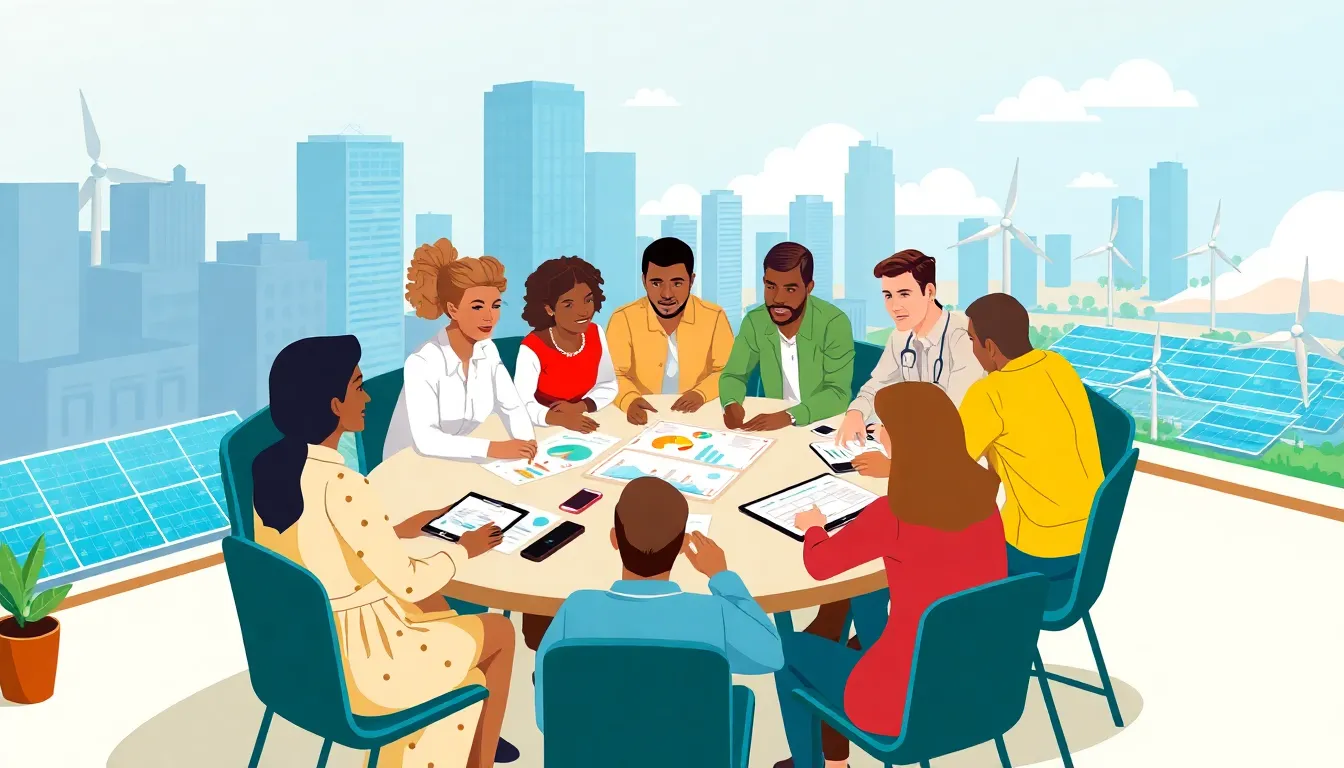In a world that’s constantly evolving, the concept of “new world systems” is more relevant than ever. Imagine a universe where technology, society, and economy collide in a glorious dance, creating systems that could redefine how we live and work. It’s like watching a sci-fi movie unfold, but without the awkward pauses and cheesy dialogue.
These innovative systems promise to tackle age-old problems with fresh solutions. From sustainable energy to digital governance, they’re not just buzzwords; they’re the keys to a brighter future. So grab your virtual popcorn and get ready to explore how these groundbreaking ideas can reshape our reality. Who knew saving the world could be this exciting?
Table of Contents
ToggleOverview of New World Systems
New world systems redefine interaction between technology, society, and economy. Global challenges necessitate transformative frameworks that align with sustainable practices. Innovations in renewable energy emerge as foundational elements of these systems. For instance, solar and wind energy technologies offer eco-friendly alternatives to fossil fuels, reducing reliance on diminishing resources.
Digital governance plays a critical role in managing societal dynamics. Online platforms facilitate transparent communication, fostering active citizen engagement. Emerging technologies, such as blockchain, enhance security and decentralization in various sectors. These advancements promote accountability while streamlining administrative processes.
Collaborative models underscore the importance of community involvement. Engaging stakeholders generates diverse perspectives, driving collective solutions. Educational programs increasingly integrate skills relevant to these new systems, preparing individuals for future workforce demands.
Economic strategies necessitate adaptability to succeed in rapidly evolving markets. Policies focusing on circular economies encourage resource efficiency, minimizing waste and maximizing value. Countries adopting these principles demonstrate resilience amid global shifts.
Lastly, social equity serves as a core value in these transformative paradigms. Ensuring access to opportunities fosters inclusive growth and addresses systemic disparities. By prioritizing educational access and workforce training, societies create pathways toward equitable participation.
New world systems represent a shift in how humanity addresses complex challenges. Engaging with these frameworks unveils possibilities for a more sustainable and equitable future.
Historical Context

New world systems have roots that can be traced back to significant shifts in technology, society, and economics. These changes foster innovative frameworks aimed at addressing global challenges.
Emergence of New World Systems
New world systems emerged from historical responses to crises. Repeated economic downturns, social unrest, and environmental challenges underscored the need for alternative solutions. Patterns in technological advancements, particularly in renewable energy, laid the groundwork for these systems. Historical events, such as the industrial revolution and the digital age, catalyzed transformative ideas. Today, these systems advocate for sustainable practices and emphasize community involvement, shaping how society approaches problem-solving.
Key Influences on Development
Several influences shaped the development of new world systems. Globalization increased interdependence, leading to shared knowledge across cultures. Innovations in digital technologies, like blockchain and artificial intelligence, revolutionized governance and resource management. Additionally, advocating for social equity highlighted the importance of inclusivity in growth strategies. Educational shifts also played a pivotal role, focusing on skills that align with these evolving systems. Together, these factors contributed to a comprehensive approach that fundamentally redefined interactions between technology, society, and economy.
Characteristics of New World Systems
New world systems possess distinct characteristics that redefine interactions between economic, social, and political elements. Each of these aspects plays a crucial role in shaping the future landscape.
Economic Structures
Economic structures focus on adaptability and resource efficiency. They prioritize circular economies, which minimize waste and maximize the value of resources. Innovations in renewable energy technologies significantly contribute to these economic shifts. Furthermore, collaborative models promote community involvement, fostering diverse perspectives on local and global issues. These structures aim to enhance resilience alongside sustainable growth, creating pathways for future businesses to thrive and adapt in a changing environment.
Social Dynamics
Social dynamics within new world systems emphasize inclusivity and equity. Engaging communities supports a more participatory approach to governance and decision-making. Education plays a vital role in these dynamics, equipping individuals with relevant skills to navigate emerging challenges. Additionally, utilizing digital platforms encourages transparency and collaboration among citizens, strengthening societal bonds. These experiences foster diverse perspectives, enriching the collective understanding necessary for addressing complex issues.
Political Frameworks
Political frameworks in new world systems focus on decentralization and transparency. Governance models leverage digital technologies to enhance citizen engagement and accountability. By embracing innovative approaches, communities can see improved responses to public needs and concerns. Collaborative decision-making becomes essential in these frameworks, driving policies that reflect diverse opinions. Promoting social equity remains a central tenet, ensuring that policies address systemic disparities and foster inclusive growth opportunities for all.
Case Studies of New World Systems
Case studies illustrate the real-world applications of new world systems. These examples highlight innovations that effectively address complex global challenges.
Example 1: Renewable Energy Revolution
In Germany, the “Energiewende” initiative stands out as a notable example of systemic change in energy policy. This initiative promotes the transition to renewable energy sources like solar and wind. By 2020, renewables provided about 42% of Germany’s electricity. Community involvement plays a significant role, with many citizens participating in local energy projects. Advantages of this model include reduced greenhouse gas emissions and increased energy security. Such initiatives pave the way for sustainable energy systems worldwide.
Example 2: Digital Governance in Estonia
Estonia serves as a leading example of digital governance implementation. Its e-Residency program allows global citizens to start and manage businesses online, demonstrating how government can leverage digital technology. By offering secure digital identities, Estonia enhances transparency and citizen engagement in governance. As of 2021, over 80% of Estonians used online public services regularly. The country’s innovative digital approach fosters economic growth and attracts foreign investment, showcasing a successful model for others to emulate.
Future Prospects of New World Systems
Innovative technologies and collaborative frameworks offer promising future prospects for new world systems. These systems hinge on the integration of sustainable practices across various sectors. Growth in renewable energy technologies highlights a shift from traditional fossil fuels toward cleaner solutions. Moreover, advancements in digital governance support increased transparency and citizen engagement.
Emerging educational programs increasingly prepare individuals for evolving demands in the job market. Such initiatives emphasize skills aligned with the needs of community-driven, sustainability-focused economies. New economic strategies advocate for circular economies that enhance resource efficiency. This approach significantly reduces waste while promoting resilient infrastructures.
Community engagement plays a central role in shaping effective new world systems. Participatory governance fosters an environment where diverse voices contribute to decision-making processes. As illustrated by initiatives like Germany’s Energiewende, local participation in renewable energy projects can lead to measurable reductions in greenhouse gas emissions.
Furthermore, technologies such as blockchain reinforce security and decentralization in governance. Estonia’s e-Residency program exemplifies the effective use of digital platforms for managing global business processes. These case studies affirm that innovative approaches significantly address complex global challenges.
Strategic collaborations between government, private sectors, and communities must remain essential. Such partnerships can promote shared knowledge that drives inclusive growth strategies. The momentum gained by new world systems indicates a transformative pathway forward.
New world systems offer a transformative approach to addressing the pressing challenges of today. By fostering collaboration among technology, society, and economy, they pave the way for innovative solutions that prioritize sustainability and inclusivity. The integration of renewable energy and digital governance not only enhances efficiency but also empowers communities to engage actively in decision-making processes.
As these systems evolve, they hold the potential to reshape economic structures and social dynamics, ensuring that growth is equitable and resources are managed wisely. Embracing these concepts will be crucial for navigating the complexities of the future. The journey toward a more sustainable and equitable world is just beginning, and the possibilities are limitless.









